#google ngrams
Text


15 notes
·
View notes
Text
Today's linguistics adventure: early uses of the word "blog".
I was back-browsing xkcd, as you do, and 1043 is this:
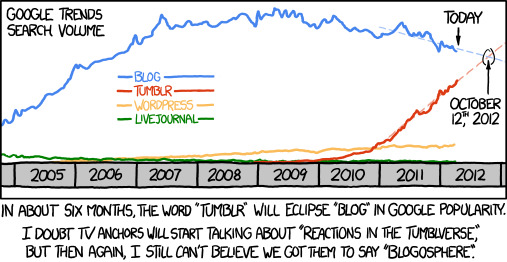
And given the...subsequent developments about Tumblr, I decided to make the equivalent graph today. I eventually found Google Trends, which I don't think is tracking exactly the same thing, but seems pretty compatible:
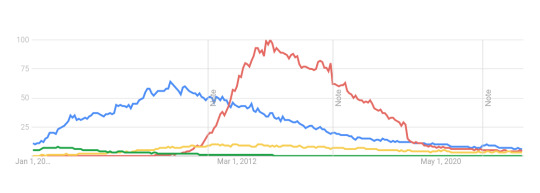
(And it's surprising to me, how long and how late Tumblr had more google searches than blog. I guess people stopped searching "blog" because everything was a blog?)
But before that I reached for ngram viewer, and got something interesting.

In this case, the interesting thing isn't the comparison; everything except blog is a visual flatline.
The interesting thing is, this search defaults to start from 1800. Why are there any hits at all? What's going on with that bump in the 1920s? (And a smaller one in the 1860s.)
Let's trim the ending of the series. We get this:
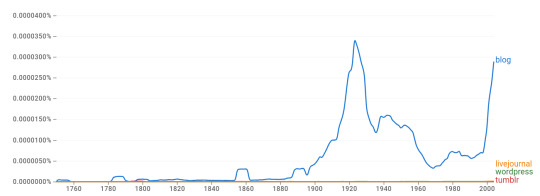
(Note this means that "blog" was more popular in the corpus in 1920 than in 2004, which seems rather improbable.)
Ngram viewer is drawing from the Google Books corpus, which is, you know, directly searchable. So I looked for hits for "blog" between 1900 and 1940. And the first valid-looking hit is from page 6 of that classic work of literature, Over-the-counter Brokers and Dealers Registered with the Securities and Exchange Commission as of January 31, 1936:
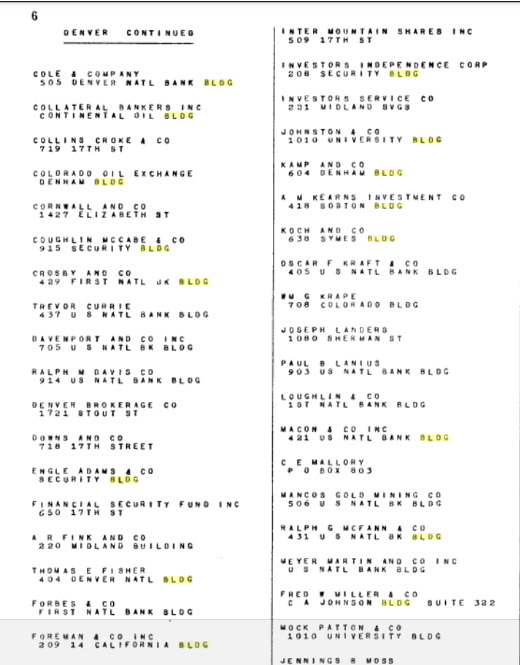
Ah. Problem solved?
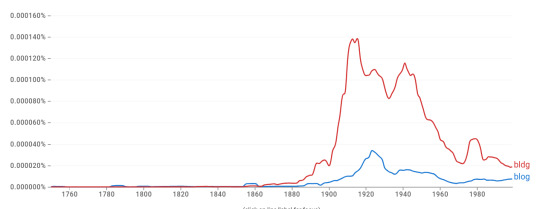
Almost! But now I wanna know what those other two, earlier bumps, are. In 1822 there's an arithmetic book that has stuff like this:

and it does seem like there are a lot more hits like that; I don't know why they're localized to the 1800s though. I think all the early bumps might be from that, though.
241 notes
·
View notes
Text

Fiona vs FIONA ngram [x]
22 notes
·
View notes
Text
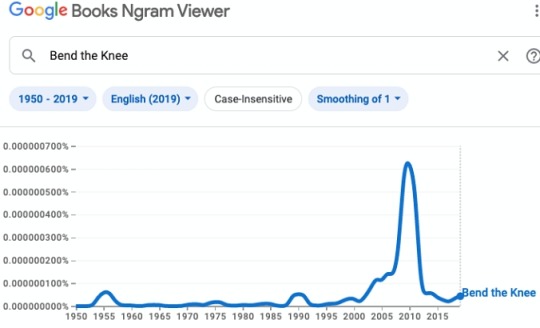
The expression "bend the knee" certainly existed long before ASoIaF. But since the first book was published on 06 August 1996 its use in English has soared.
Google Books Ngram Viewer, of course, only covers books. So there was a dip after the publication of A Dance of Dragons in 2011. Though because of the HBO series the expression has entered the general lexicon and is being used by people who've neither read ASoIaF nor seen GoT. So as of 2019, the current end date of Ngram searching, it was moderately trending upwards again.
The mass worldwide web, at least Net 1.0, began around 1995. That's slightly before the time A Game of Thrones was published. So there's not much data prior to its publication to compare online use of "bend the knee" before its release and after. But use of the phrase is now extremely common – particularly in political discussions. Mainstream legit news media use it unselfconsciously.
It seems to be used particularly often in connection with a certain US political figure.

However, with several criminal cases facing him this year, another GoT phrase may apply to him: Winter is Coming for Donald Trump.
#game of thrones#house of the dragon#asoiaf#bend the knee#language#google books ngram#donald trump#gra o tron#trône de fer#kampen om jerntronen#pemainan takhta#a guerra dos tronos#juego de tronos#trono di spade#taht oyunları#trò chơi của ngai#valtaistuinpeli#hra o trůny#isang kanta ng yelo at apoy#гра престолів#왕좌의 게임#权力的游戏#ゲームの玉座#صراع العروش#গেম অব থ্রোনস#تخت کے کھیل#गेम ऑफ़ थ्रोन्स#சிம்மாசனத்தில் விளையாட்டு#משחקי הכס#игра престолов
23 notes
·
View notes
Text
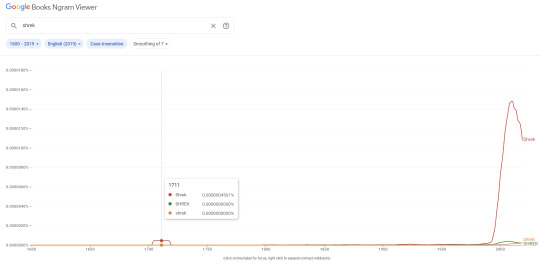
what time traveler was responsible for this?
2 notes
·
View notes
Text
god, I love leftovers. Thank you, refrigerators and freezers, microwaves, etc., for the ability to make one of the five dishes I willingly consume and eat it the entire goddamn week.
#refrigerator appreciation post#freezer appreciation post#I wrote a whole list of questions I have about the development of the concept of “leftovers” but I scrapped it because too goddamn long#like no one wants to hear me ask a bunch of questions I could answer but won't because that requires finding and reading research or source#because I can't let myself be inaccurate can i#no I am compelled to be as accurate as possible in my dumbass rabbithole expolorations and that takes too many characters#I had two screenshots of the Google Ngram Viewer
0 notes
Note
fiddleford's middle name is "hadron". the term "hadron" was coined in 1962 and, according to google ngram viewer, didn't really take off until 1965 (in terms of replacing the previous term "strongly interacting particle"). according to the gravity falls wiki fiddleford is 72 years old in 2012, meaning he was born in 1940 or -41, a full two decades before the word was invented. even if the specific age of 72 is inaccurate, he must have been born at the latest in 1957 in order to have attended backupsmore university with stanford in 1975. fiddleford's parents absolutely did not give him the name hadron. fiddleford gave himself the name at age 21-ish. fiddleford hadron mcgucket is transgender. happy friday

fiddleford winning 1st place in transgender. most trans guy of all time.
#I'm so curious where the wiki got age 72...#I'm just assuming that no matter what he gave himself his first and middle name#bc i love trans headcanons#scribbles#ask#gravity falls#fiddleford mcgucket#happy friday to you anon#thank you for the trivia btw
2K notes
·
View notes
Note
In Old English, the word sibling meant “a relative”, until the word went extinct in the early Middle English period, around 1400. It was brought back in the 1900s (the decade) and given its modern sense, but only as a technical term used by geneticists. I can’t find a source on when it became an everyday, normal-person word.
Weird! Neat! I think generally that transition is poorly sourced? Maybe try Google ngrams
382 notes
·
View notes
Text
The "Middle West"
I was recently watching Trump speak (not something I typically do 🤢), and the most interesting thing he said had nothing to do with anything he was actually talking about: It was that he used the term Middle West to refer to that generally north-central part of the United States, centered on the Mississippi River, that is neither the South nor the Northeast (nor the Mid-Atlantic, but that's really just a subcategory of the Northeast that Northeasterns use to not get lumped in with each other).
We all know it today as the Midwest. But in times past it was much more commonly known as the Middle West.
(Tangent: It is also one of many geographical region-name reminders of our national East Coast beginnings, as America has like six different kinds of "West": the Midwest, the Southwest, the (Pacific) Northwest, the Mountain West / Interior West, the West Coast / Pacific West—and that's not counting the deprecated terms (such as "Far West," i.e. distinguished from the Midwest) or the old Northwest (which would've referred to places like Ohio and (what we know as) West Virginia)!)
Over the course of the 20th century, "Midwest" became an increasingly common form of the term, eventually overtaking "Middle West" in popularity and, by our lifetimes, completely replacing it. The only people who still use "Middle West" today are very old. I'm only aware of the term's existence because I'm a fan of midcentury media and if you go watch (for example) old Dragnet episodes from the 1950s you'll hear the term used.
I was looking at the Google Ngram Viewer to get a sense of the relative usage frequencies of these terms, and I noticed something interesting: Not only has "Middle West" been driven almost extinct from active usage, but "Midwest" itself has also declined precipitously in the 21st century. People today are not calling the Midwest the "Midwest," at least not with the frequency and relevancy they once did. I was curious if this was another permutation of the usage, so I also looked up "Midwestern" (which I included in the link above), thinking that maybe people nowadays are calling it the clunkier "the Midwestern states" / "the Midwestern US," but the adjectival has declined in step with "Midwest." It really does seem to be that people are just using this geographical category less often.
Perhaps unsurprisingly: the sociopolitical cohesiveness of the Midwest has significantly diminished over time. I think most Midwesterners would still recognize and affiliate with the term if you applied it of them to their faces, but increasingly I think many of them do not think of it in their daily lives as a personal or cultural identifier. Which has many fascinating implications that I'm not going to get into.
(Another Tangent: I feel like I've talked about specifically this "Middle West / Midwest" thing on Tumblr before, but I feel that way about half of everything because after all I've been writing down my thoughts for over 20 years and I've been having thoughts for considerably longer than that, and it's often not clear to me what I've talked about publicly and where.)
Anyway, this entire post is really just me scratching the itch of verbal brain noise about the orange guy using a term in a public address that I never hear people use in the present day. A little piece of lost language, hearkening back to a completely different era and world.
#To be fair America also has like four “Easts”#The Northeast and the Southeast and the Eastern Seaboard and of course the East Coast#And several “Norths” albeit rarely in name which I guess is actually kinda standout#Including the Upper Midwest and New England and the aforementioned Northeast and the Industrial / Rust Belt#BUT ONLY ONE “THE SOUTH”#Well not counting Southwest#Which is more commonly associated with barbecue and airplanes and sagHWWaro cacti#And the Southeast#Which is really just a polite term for “The States Where People Go to Lose Their Damn Minds"#“And Where Horrifying New Superbugs Evolve Every 10 Minutes”#Hot Dish
32 notes
·
View notes
Text

get a load of this butthurt yankee who believes language is static. according to the google ngram viewer "crack whore" wasn't a real term until the 1990s, and "USAmerican" appears in literature about a decade earlier than that colorful insult

Also you missed a "will" between "never" and "be". If you're gonna be an ass about the correct use of language at least proofread your tantrums
43 notes
·
View notes
Text
BG3 Withers dialogue writing resources
Withers seems to be one of the more difficult characters to write in fanfic because of his archaic way of speaking. But since he's pretty significant in the fanfic I'm working on, I've been going through the datamined game transcripts reviewing all of his lines in attempt to synthesize a Withers Style Guide:
Pronouns: "The Basics of Shakespeare Pronouns: Thee, Thy, Thou, Thine, Ye" explains it better than I can (caveat: Withers doesn't use "ye").
Contractions: He almost never uses them. The only examples I could find were I'd (1), ne'er (3), shan't (1), 'til (5), and upon't (1).
Auxiliary verbs: He seems to use them whenever grammatically possible, sometimes with modern spellings (am, are, be, is, must, shall, will) and sometimes with archaic spellings (canst, didst, dost, doth, hast, hast, hath, mayest, needeth, needst, shouldst, wilt, wouldst).
Verb conjugations: The game writers weren't terribly consistent with these, but he tends to conjugate second person singular verbs with -est/-st endings and the third person verbs with -eth/-th endings. He seems to use mostly modern conjugations when speaking in the first person.
Vocabulary: He peppers his speech with dated terminology like bosom companion, cleave, forsooth, pittance, proffer, seneschal, yoke, etc. (Google Books Ngram Viewer is a good tool for checking how dated a term is.)
Verbosity: Withers is generally quite terse. If the rule of thumb for writing Gale is use twice as many words as necessary, then the rule of thumb for writing Withers is to use as few words as possible (with the aforementioned exceptions of no contractions and lots of auxiliary verbs). Or simply have him refuse to elaborate as that is very in-character for him.
Complete corpus: I went through the datamined files and copypasted all of Withers' lines into a Google Doc because I personally find it useful to immerse myself in a single character's voice before attempting to write them. Please note that it includes cut content as well as MAJOR SPOILERS FOR EVERYTHING because he narrates the epilogue. I included the file names as headers in case you want to refer back to the datamined dialogue for the context in which he says a particular line.
#BG3#Baldur's Gate 3#bg3 fanfic writing resources#Withers#Withers BG3#BG3 Withers#Jergal#Jergal BG3#BG3 Jergal#the autism won today
137 notes
·
View notes
Text
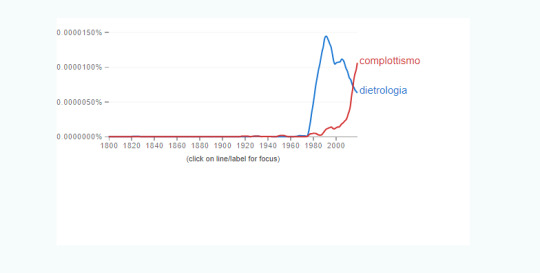
IL SORPASSO.
Frequenza dell'uso dei termini "complottismo" e "dietrologia" - il nome che gli si dava nel secolo scorso - secondo Google Ngram Viewer, il servizio di Google che misura le occorrenze delle parole nei libri pubblicati in una data lingua sui libri digitalizzati fino al 2019.
Via https://www.ilpost.it/2024/02/08/sgobba-quando-il-complottismo-si-chiamava-dietrologia/
Della parola “complottismo”, prima degli anni Ottanta non ci sono occorrenze. “Complotto” è un francesismo che all’inizio era semplicemente sinonimo di “folla”, poi venne usato al posto di “congiura” o “cospirazione”, si diffuse negli anni Venti attraverso l’espressione “complotto giudaico”.
«(Dietrologia é) parola sconosciuta in altre lingue. (E') la convinzione che quel che si vede, si legge e si sente dire non è la verità, ma che essa sta dietro, sotto, sopra, accanto, al di là – comunque non esposta agli occhi dell’uomo della strada», scriveva nel 2001 lo storico della letteratura italiana Joseph Farrell. A quel tempo "dietrologia" era termine dismissivo usato da decenni dai conservatori - Indro Montanelli il principale - per descrivere la mentalità "vi stanno fregando di nascosto, non ci cascate" tipica della sinistra ruspante d'allora.
Complottismo supera e rimpiazza dietrologia per via internazionale. Siamo nel 2015, l’anno delle campagne elettorali Brexit e dell’elezione di Donald Trump. Dopo la "first reaction, choc" (cit. Renzi) del mainstream media a quei due accadimenti nefasti (per loro), parte la delegittimazione.
Ironia del destino cinico e baro: prima la "dietrologia" distingueva la sinistra, ora essa subisce il complottismo, senza rendersi conto che sono loro, elite e affluent, ad essersi spostati (dal popolazzo alla turris eburnea). Alcuni reagiscono: pur essendo ora elite non è il caso di togliersi un'arma così potente. I chierici dell'ortodossia del Wu Ming 1 propongono di distinguere tra ipotesi di complotto (specifiche, confutabili, limitate nel tempo) e fantasie di complotto (universali, inconfutabili, eterne). Molto logico sul piano teorico, solo che sul piano pratico si esercita mediante presidi "fact checking": carubbaneri al posto di blocco lungo la circolazione delle idee, patente e libretto.
31 notes
·
View notes
Note
Hi! Hope you're having a nice day, I'm not a native English speaker so I've always wondered something kind of silly that still bothers me from time to time but do you happen to know why are afghans called afghans?
Hi there! I hope you're having a good day too.
That's a great question. Like much of knitting history, there doesn't seem to be a definitive, well-researched, satisfying answer.
I tried Google Ngram for the phrase "afghan blanket" to get an idea of how old it is. The first usage Google knows of appeared around 1865.

(As a side note, the first use of "afghan throw" appears in 1948. "Knitted afghan" appears in 1877, "crocheted afghan" in 1873.)
I checked Newspapers.com for the phrase "afghan blanket" and did see this ad from December 23, 1850 that mentions "Affghan blanket"

Interestingly most of the 19th century references to the term capitalize "Afghan". Today it's usually not capitalized. So it seems likely that it was associated with Afghan people, but that association is gone now.
I found the Dictionary of Word and Phrase Origins from 1962 on the Internet Archive which proposes that afghan blankets were inspired by Victorian love of colonialism/colorful rugs made in the Afghanistan area:

I couldn't find any confirmation for this claim, but it feels reasonable?
Here's some 19th century rugs from Afghanistan, both from the Victoria & Albert Museum:


And here's a knitting pattern for an Afghan from 1884 from The Ladies' Guide to Elegant Lace Patterns, Etc.:

98 notes
·
View notes
Text

was messing around with Google Ngram and accidentally stumbled across this amazing news snippet from a 1967 issue of Jet magazine
absolute Frank Reynolds behavior
#things you'd think happened in an episode of iasip but were actually real life#actually if you consider danny devito's age and the year this happened it could have actually BEEN frank reynolds#flashback episode when?
12 notes
·
View notes
Text
me using google ngram to make sure a word i'm using in my fic would actually exist or be said in 1900 even though no one actually cares as long as bvz doesn't say 'yolo' or something
17 notes
·
View notes
Text

Okay so I wanted to answer the question (weird graphic effect so you can tell it’s a screenshot):
What is a wazoo and how do you have things up/out of it?
Eric Patridge’s slang dictionaries all say it’s the butt with citations from the 70s, but Wiktionary’s oldest citation is from 1969 somebody saying they got theirs shot off

So I turned to Google Ngrams and the oldest they have is from a 1903 “Missionary Review” where the term is used in a supposed letter from the Bombay Muslim community to refer to a ritual bath; I can’t find any other use of it in this sense, but then again i have no idea what language the 1903 Bombay Muslim community was speaking so it’s possible it’s just a transliteration problem. That or a 1903 missionary newspaper isn’t the best source for ethnographical lexicography


Other older uses of the word
The ambassador to “Ava” claiming it’s a month of the “Birman” calendar
A 1920 Harper’s Weekly “New Nonsense Novel” in which it’s a native tribe from some exotic country that those wacky racial equality activists think should be allowed to attend Oxford
A joke pronunciation of French “oiseau” which may seem unrelated BUT I also see that in mid-century British slang “giving someone the bird” meant “making a fart noise with the tongue stuck out”, which is butt-related but pretty circumstantial.
So yeah. I don’t know.
41 notes
·
View notes